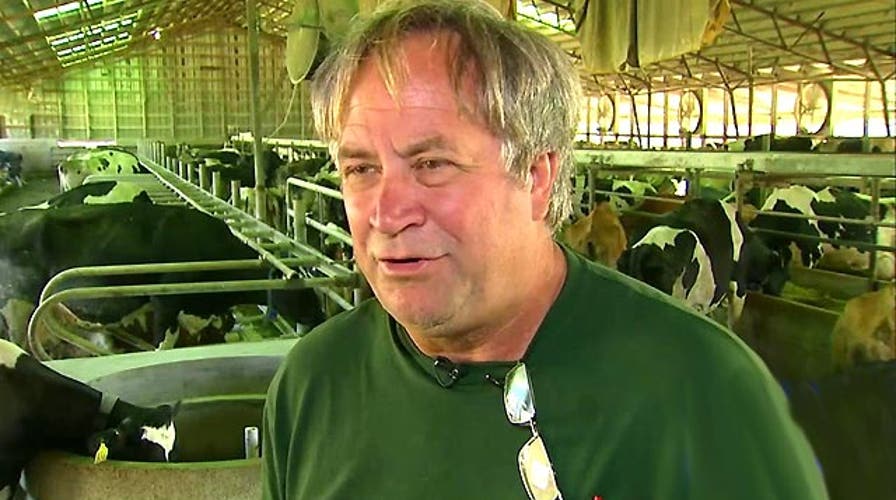How one farmer ended up on the wrong side of the IRS
Lawmakers blast agency's commissioner over flawed structuring laws
Randy Sowers built his dairy farm over three decades into a thriving business. After kick-starting with a $100,000 loan, today the South Mountain Creamery has 1,000 cows and 70 employees delivering milk, ice cream and other products to homes in the Washington, D.C., area.
But the Maryland farmer’s operation suffered a big setback when the IRS swooped in to seize tens of thousands of hard-earned dollars from his account, claiming he violated an obscure banking law.
And despite the federal agency all but admitting the law they used to seize the cash is flawed -- and at least one member of Congress calling the move unconstitutional -- Sowers is still fighting to get his money back.
“We work hard for what we get, and the government can just come in and take that. It's not what it's supposed to be,” Sowers told Fox News.
Sowers was targeted by the IRS under a controversial policy concerning the size of bank transactions. Banks are supposed to fill out extensive paperwork for every cash transaction over $10,000 – but to intentionally keep transactions under that threshold can be a violation called “structuring.”
Sowers, 61, found himself accused of this after becoming, it seems, a victim of his own success. As his company got bigger over the years and his employees went to more and more weekend farmers markets, they ended up with a lot of cash come Monday morning.
This is where the taxman trouble started, as he says the bank sought limited deposit amounts. “We'd had our festival and we get a lot [of] extra money,” Sowers explained. He said the bank teller told them they’d take their $12,000 in deposits, but they’d be “better off” if they kept it under $10,000, since “there is a lot of paperwork we have to fill out if you have to deposit more than $10,000.”
Under the “structuring” laws, doing what the teller suggested is technically a crime.
And so three years ago, Treasury agents showed up at the creamery with guns and badges. Sowers told them everything he could about his cash transactions, hoping to prove he wasn’t hiding anything. But as soon as they heard he sometimes had more than $10,000 and didn’t deposit all of it to stay under the reporting limits, they seized over $60,000 in his bank account.
Out of fear of a jail sentence and a nearly half-million dollar fine, Sowers settled -- letting the IRS keep about $30,000 of his hard-earned money.
But he doesn’t think it’s right.
“I’m not going to do anything wrong, it’s against my religion for one thing,” he said, while inspecting his herd on his farm.
In February, he took his fight to Capitol Hill, testifying in an open-collar shirt and with a full beard. “We are just hard-working farmers, we don’t have time to be criminals,” he told lawmakers.
Rep. Charlie Rangel, D-N.Y., and others on the House Ways and Means Committee agreed during the hearing that something was wrong with a law that made Sowers and others’ above-board transactions illegal. “That law to me is unconstitutional, unreasonable and stupid,” Rangel said.
Sowers’ run-in with the IRS is just one of several cases that have come to light where the feds seized an otherwise law-abiding business owner’s cash for supposed “structuring.” IRS Commissioner John Koskinen has pledged they are changing their procedures, saying, “we're simply saying that we're not going to go after an asset seizure if there is no indication of illegal activity.”
But the change is not retroactive, leaving people like Sowers in the lurch.
At least two congressmen on the Ways and Means committee have taken up the case, writing letters to Treasury Secretary Jack Lew saying they believe Sowers should get his money back. Sowers says he’s not optimistic, but will keep fighting.





